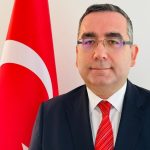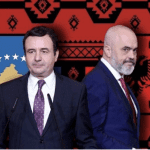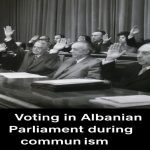By Albert Rakipi
In March 1997 Dutch ambassador Jan de Marchant et d’ Ansembourg assured Albanian authorities on behalf of the European Union that “Albania is part of the great European family”. Situated in Europe’s backyard, the small Balkan country was facing the most difficult challenge of its modern history. After the anarchy of the pyramid schemes, law and order was returning thanks to European assistanceطhich was precisely what the Dutch diplomat was referring to. The multinational operation force code- named ALBA was composed almost entirely of troops from EU member states. The successful operation was largely a European endeavor, – design, military contingent, technology, diplomacy- however it failed to be an EU collective security action. As the multinational forces started to be deployed in Albania, local citizens noticed that instead of the yellow starred flag of the EU, the European soldiers raised their own national flags؇reek, Italian, Austrian, Spanish or Portugueseدn the territories that their national Governments had already agreed upon.
Although this Albanian example may be insignificant in the larger scheme, it serves the purpose of illustrating the enticing possibilities and the practical impossibility of a successful European collective security system that would emerge from a Common Foreign and Security Policy. On the other hand, the attempts towards CFSP as the most significant element of EU deepening are a test of the survival of the European project and the strengthening of EU itself. In more than a decade and a half since the end of the Cold War, we have witnessed a dynamic process of enlargement and deepening of the great European project through the membership of new states especially in the 2004 big bang, and through the adoption of a common market and currency. Looking at these processes, there is no doubt that the European worldدr, in the words of Robert Kagan, the Kantian worldةs becoming increasingly more real. If the deepening of the European project continues at such a pace, the strategic weight of Europe would rise considerably and so would its contribution to global peace and development.
When Albanian citizens in March 1990 took to the streets in order to claim back their right to a normal life with the motto “We Want Albania to be like Europe,” the perception of Europe was a mythical one. According to Helene Ahrweiler,1 this is common to all Balkan countries including the ones that have been members of the EU for a long time now. However, fifteen years later Europe and the European Union have gotten closer to constituting a “real world”, while Albania’s European perspective has become the driving force behind the process of state and regime building. At the society level, during the last five years,2 the EU has topped the list of countries/organizations with which the government ought to have strategic relations. At the elite level, it would be useful to look at the debate on the proposals for UN Security Council reform and the potential role of the EU in order to note Europe’s metamorphosis from a “Kantian world” to a real one even for countries that are at the periphery of the EU. Although Albania may carry little weight, its voting patterns mirror European ones.3 And, in the context of competing German and Italian proposals for UN reform, the dilemma of Albanian administrations may have been solved through a common European proposal.
The need for a strategic role for the European Union and especially on UN reform follows quite naturally from the European project and the values that it upholds. While the process of reform and the future role of EU present a difficult dilemma for countries like Albania, the dilemmas and responsibilities are even greater for the historical members of the EU and the EU itself as a global player.
From a theoretical and practical perspective is it possible and at the same time useful for the EU to possess a single seat on the Security Council since its reform is being considered?
Having a single seat means possessing a single voice. As such, a single vote in the Security Council would be the crowning achievement of the European projectشhe large member states would have to forego their seats and find the mechanisms of harmonizing foreign policy. But, it is too Kantian an idea to be realistic although it inspires the romantic love that may one day carry it to fruition. At this stage, no one can seriously contemplate France with its Gaullist heritage or Britain with its soft Euro skepticism to give up one of their most prized foreign policy possessions, UNSC seats, in favor of as vague and altruistic a reason as EU CFSP. No major EU member is ready yet to give up the holiest domain of national sovereigntyئoreign policyإspecially since it is unclear what they would give that up for.
Secondly, the idea of a single European seat is not a utility maximizing solution. From a Realist perspective of international relations, by gaining a seat and giving up several European states’ seats, Europe as a whole would have less weight in the Security Council. And, if EU member states do achieve a common position in foreign policy, would they not be better positioned to project that common position through a caucus of permanent Security Council members?
However, despite the fact that a single European seat at the UN Security Council- is not possible and may not even be useful, the projection of power by the European World in UN reform is indispensable for global governance in the twenty first century. The job of figuring out how to turn that dream into reality, is one of the most difficult yet rewarding challenges facing European policy-makers.
The Author is Chairman of Albanian Institute for International Studies ( AIIS) . This article is part of an edited version of an essay to be appear in the fall issue of Europe’s world
1 Helene Ahrweiler ” The making of Europe,” Nea Synora” Athens 2002
2 See Tirana Times vol. 2 No.52 2006 at www. tiranatimes.com or see AIIS, Rethinking European Integration, AIIS: Tirana 2005 or at aiis-albania.org.
3 And, when they do not, as it has happened several times in the last fifteen years, it seems strange enough. Most have considered such exceptions as mistakes that are not congruent with Albanian interests.










